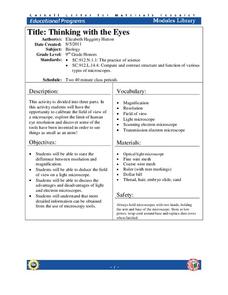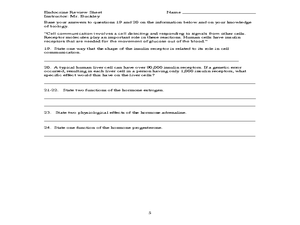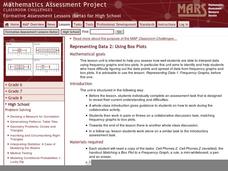Virginia Department of Education
Isotopes
Lead your class through the amazing world of isotopes as they investigate the various properties they contain and further understand their respective location on the periodic table. They explore half-lives and radioactivity as each...
Cornell University
Thinking with the Eyes
Objects are larger (or smaller) than they appear! Scholars use a laboratory investigation to explore the difference between resolution and magnification. The activity allows them to calculate the size of the field of view of their light...
Serendip
From Gene to Protein via Transcription and Translation
DNA carries the codes for creating just the right protein. A well-designed lesson plan leads pupils through the process from start to finish and everywhere in between. Guiding questions with supporting video help scholars understand the...
Biology Junction
Plant Diversity
Ginkgo trees existed for more than 350 million years, and, at this time, only one species still remains. While plant diversity generally increases over geologic time, some interesting exceptions occur. Young scientists learn about plant...
Curated OER
Semipermeable Membranes and Bioaccumulation
Beginning biologists place a drop of food coloring into water of differing temperatures to observe the effect on the diffusion rate. They remove the shells from raw eggs and then experiment with osmosis over the remaining membranes....
American Museum of Natural History
Microbes Coloring Book and Scavenger Hunt
Coloring pages showcase microbes—bacteria, viruses, and protists. Scholars have the option to download a coloring book and scavenger hunt or color the page directly on the computer. Three paragraphs describe each microbe.
Curated OER
Genes, DNA, and Mutations
With paper DNA patterns, budding biologists model translation and base-pair substitution within sequences. Through these activities, they examine how mutations can result in genetic disorders. The modeling that occurs is an enlightening...
Curated OER
Genetically Modified Organisms
High Schoolers complete a variety of activities as they examine the ethics of (and take a position concerning) genetically modified organisms in the field of agriculture. They complete a PowerPoint demonstration to go along with the unit.
Curated OER
Endocrine Review Sheet
Starting with a diagram of the kidneys and urinary tract of the human, this sheet has questions about excretion, blood concentrations of hormones, gland feedback mechanisms and the effects of some hormones.
Curated OER
Physiology of Reproduction
In this health worksheet, students examine the human body and make mental connections to the target function highlighted in the sheet.
Curated OER
Light, Colors, and Vision
Third graders experience optic illusions by creating flipbooks. In this optics lesson, 3rd graders view a demonstration of the workings of rods and cones using a camera. They are shown an optical illusion and work to create their own...
Curated OER
Understanding Dialect as Used by Mark Twain
A reading of Mark Twain’s The Celebrated Jumping Frog of Calaveras County not only offers pupils an opportunity to practice their listening skills but also provides them with examples of dialectic speech. This is the gol’derndest lesson...
Curated OER
Errors of Meiosis: Chromosomal Abnormalities
After viewing these concise summaries of the common chromosome abnormalities that cause disorders, students' understanding of genetic errors will be much better. This presentation has clear diagrams to accompany the explanations....
Curated OER
Kingdom: Fungi
The general characteristics that affect classification of fungi and other organisms in the domain Eukarya are detailed for the students on 12 attractive slides. Teachers can access individual slides to cover life cycles or...
Curated OER
Protists and Fungi
Here is an outstanding presentation on protista. It lists general characteristics, and then moves on to describing three different categories of protists. For each, viewers learn physical features, behaviors, and means of reproduction....
Garden Earth Naturalist Club
Parts of a Flower! Flower Dissection
Sometimes the best way to learn about plants is to see the different parts of a plant yourself. Groups of learners dissect flowers to answer questions about what they observe and what they wonder about their flower.
Biology Junction
Protists and Fungi
It's alive, but what is it? Protists share similarities with plants, animals, and fungi without being classified as any of those three. Learn more about protists and the kingdom fungi with a short presentation. It describes the parts of...
The Science Spot
Flower Basics
Learn about plants and pollination with a worksheet about the parts of a flower. After labeling the anatomy of a flower using a word bank, kids explain the difference between self-pollination and cross-pollination, and unscramble...
Inside Mathematics
Magic Squares
Prompt scholars to complete a magic square using only variables. Then they can attempt to solve a numerical magic square using algebra.
Kenan Fellows
Unit 4: The Brain
Drugs interact with the brain to alter moods, emotions, and behaviors by changing the brain's chemistry, perceptions, and interactions. The final lesson in the Pharmacology unit shows scholars experiments, has them complete four labs,...
Curated OER
DNA on Stick
Students experience a "hands-on" activity to get visual evidence of the physical nature of DNA and the process of DNA purification. They explore one method of chromosomal DNA isolation and DNA extraction.
Curated OER
Metabolism & Enzymes
More extensive than just a general overview of digestion and reactions, this slide show gives information about all areas of enzyme function. Topics like the chemistry behind efficiency of enzymes, factors that affect speed of...
Curated OER
Representing Data 1: Using Frequency Graphs
Here is a lesson that focuses on the use of frequency graphs to identify a range of measures and makes sense of data in a real-world context as well as constructing frequency graphs given information about the mean, median, and range of...
Curated OER
Representing Data 2: Using Box Plots
What information can be gleaned from a box and whiskers plot? Discuss the five summary values - minimum, maximum, upper and lower quartiles, and median - and what conclusions can be made from these values? Included here is a matching...
Other popular searches
- Cell and Molecular Biology
- Biology Unit Cell
- Biology and Cell Organelles
- Biology Cell Structures
- Biology Cell Respiration
- Biology Cell Function
- Biology Cell Energy
- Biology Cell Membranes
- Biology Cell Types
- Biology Cell
- Biology Cell Nucleus
- Biology Eukaryotic Cell
























